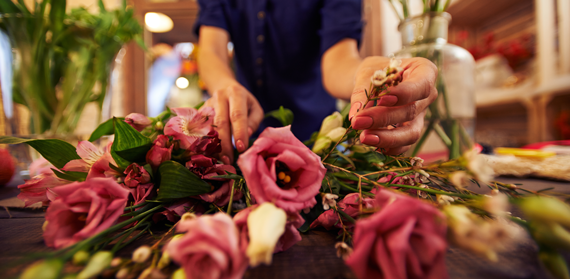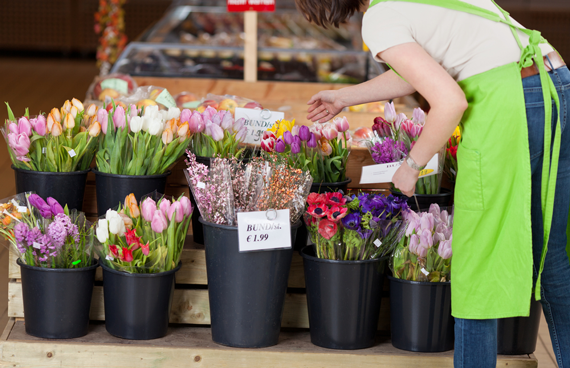Image: Shutterstock
Dr. Jill Timms, CBiS Associate School of Strategy and Leadership, Centre for Business in Society
In many parts of the world, February 14th is a day to celebrate the love in our lives or to declare it. Historically, this is the Feast Day for Saint Valentine, a third century Roman priest who, legend claims secretly married young soldiers despite Emperor Claudius banning them from taking a wife, in case it made them less committed. Today though, St Valentine’s Day is big business, particularly for the flower industry.
However, how many of us know where the flowers in our vase have come from, who has grown and cut and packed them, and under what conditions? Does this matter or have any implications for what we might be saying with the flowers we give?
At Coventry University we are currently asking questions about what an ‘ethical flower’ might be, and the issues involved are fascinating, complex and directly related to the challenges of global supply chains experienced by many industries.[i] Flowers are a very particular type of product though, imbued with cultural meaning, used to mark significant life events such as weddings and funerals, and to express our thanks, regret or love. On a practical basis they are also particular due to their very limited shelf life with high consumer expectations of presentation, needing specialist care in transportation in a similar way to food crops.
Key environmental issues for flowers include the use of chemicals to increase production and prolong life (see Lesmes-Fabian and Binder, 2013), the impact of wild flower harvesting on biodiversity (see McEwan, Hughes and Bek, 2014), and water use on farms (see Mekonnen, Hoekstra and Becht, 2012). Impossible to separate from these are key social issues that impact communities and flower workers, which are being exacerbated by newly developing countries, such as Tanzania, Ethiopia, Kenya, Uganda and Columbia, aggressively pursuing flower exports. A rise in direct buying from supermarkets is also intensifying competition and pressure to cut costs. Investigations into conditions on some farms report the largely unorganised, female workforce suffering discrimination, precarious employment, poor health and safety protection, and sexual harassment (for example Kenya Human Rights Commission, 2012). Key political issues are linked, such as land rights, and favourable tax and conditions offered to attract flower investment in warmer/poorer/cheaper countries. A recent example involved riots on foreign owned flower farms in Ethiopia, related to unrest over Government land policies and provincial boundary disputes (Dunne, 2016).
What does all this have to do with buying your red roses today? I would argue, quite a lot. It is not only a question of where you stand on ethical consumerism and whether you wish to support good practice with your purchase. Price and security of supply are important considerations. About 90% of flowers sold in the UK are imported and it is a £1.8 billion industry, with 70% of us having bought flowers as a gift during 2014 and the average UK consumer buying flowers for themselves 17 times a year (Mintel, 2015). As 40% of our flowers are still imported via the Dutch auction house, our own politics of Brexit is another aspect. Without sustainable supply chains, then availability, price, and likely quality too, will become an issue for all flower buyers.
And what of the ethical question? Consumer campaigns to increase awareness of these issues have been more pronounced in other European countries than here. But this might be about to change. A surprising fact is that the industry has already been attempting to address issues by certification of some supply chains that reach certain standards, in terms of employment and/or environmental practices. However, the myriad private certification schemes are complex, going well beyond the Fair Trade label that is usually the only one recognised, and are largely hidden so they cannot inform buying decisions (Timms, 2012).
With my colleague Dr David Bek, assistants Natalie Dukes and Nora Lanari, as well as collaborators at the University of Amsterdam, our research is finding a lack of understanding or awareness of these certifications not only amongst consumers, but also florists and even wholesalers. There is an important opportunity here, both for retailers to appeal to the growing ethical awareness of consumers, and for consumers to promote improved environmental and social conditions. Our ongoing work is developing mechanisms to facilitate these benefits being experienced throughout the supply chain.
For today, if you are off to buy your loved one flowers, asking questions about their origin and any certification is a great first step. Getting the conversation started and demonstrating there is interest in the ethics of flowers, can all help towards a change in practice and ensure the meaning of your gift is a positive one for all those involved. Happy Valentines.
References
Dunne, H. (2016). ‘Ethiopian flower farms attacked due to country’s unrest’. The Florist. 6 September 2016. At: http://theflorist.co.uk/the-florist-magazine-news/1904-ethiopian-flower-farms-attacked-due-to-country-s-unrest
Kenya Human Rights Commission (2012). ‘Wilting in Bloom’: The Irony of Women Labour Rights in the Cut-flower Sector in Kenya. Kenya Human Rights Commision: Nairobi. At: http://www.khrc.or.ke/publications/63-wilting-in-bloom-the-irony-of-women-s-labour-rights-in-the-cut-flower-sector-in-kenya/file.html
Lesmes-Fabian, C., & Binder, C. R. (2013). Pesticide flow analysis to assess human exposure in greenhouse flower production in Colombia. International Journal of Environ-mental Research and Public Health, 10, 1168–1185.
McEwan, C., Hughes, A. and Bek, D. (2014). Futures, ethics and the politics of expectation in biodiversity conservation: A case study of South African sustainable wildflower harvesting. Geoforum, 52, 206–215.
Mekonnen, M. M., Hoekstra, A. Y., & Becht, R. (2012). Mitigating the Water Footprint of Export Cut Flowers from the Lake Naivasha Basin, Kenya. Water Resources Management, 26(13), 3725–3742.
Mintel (2015). Cut Flowers and Houseplants – UK – February 2015 Executive Summary, February 2015. Mintel Group Ltd: London.
Timms, J. (2012). ‘Product-focused campaigning: Cut flower workers’, Ch 6 in J. Timms, Where responsibility lies: Corporate social responsibility and campaigns for the rights of workers in a global economy. At:
http://etheses.lse.ac.uk/3070/1/Timms_Where_responsibility_lies.pdf
[i] British Academy/Leverhulme Trust funded project (2016-2018) Promoting ethical flowers for the promotion of improved conditions in supply chains: The disconnect of increased social certification and poor purchaser knowledge. (PI Jill Timms, Coventry University).





Comments are disabled